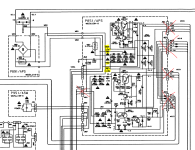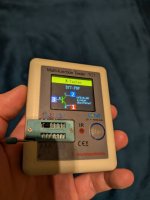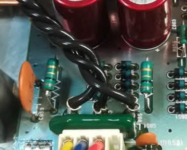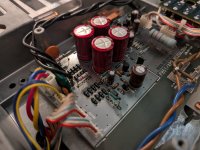Hello everyone, I am trying to figure out why resistors R870 and R871 are burning out on the power supply board of the Marantz PM16. All connectors from the board have been disconnected, only the input power remains connected.
I bought the amplifier with regular 150R resistors instead of the original fusible ones. 😳 These don't burn out, but the ±60V voltages are incorrect. If everything is connected and the regular 150R resistors are in place, as it was when I bought it, the -60V rail measures -38V, and the +60V rail measures +25V. The 5V and 22V rails are correct. I have already measured almost everything on the power supply board. If I test it using a 100W light bulb, the 1.2R fusible resistor does not burn out.
Q854 (KRA104M on my board) seems suspicious. It measures strangely, but that might be due to its different internal structure.
Have you encountered a similar problem? Thank you.
I bought the amplifier with regular 150R resistors instead of the original fusible ones. 😳 These don't burn out, but the ±60V voltages are incorrect. If everything is connected and the regular 150R resistors are in place, as it was when I bought it, the -60V rail measures -38V, and the +60V rail measures +25V. The 5V and 22V rails are correct. I have already measured almost everything on the power supply board. If I test it using a 100W light bulb, the 1.2R fusible resistor does not burn out.
Q854 (KRA104M on my board) seems suspicious. It measures strangely, but that might be due to its different internal structure.
Have you encountered a similar problem? Thank you.
Attachments
Hi, I have checked the board and there is nothing wrong with it. I think the blowing of the fuse resistors I am using is caused by a current spike when the amp is turning on. I'm starting to be unsure if they are even fuse resistors. Would anyone be able to advise what type of resistors these are? Thank you

Attachments
How did you come to that conclusion?Hi, I have checked the board and there is nothing wrong with it.
I removed the P851 board, used a different transformer, and placed 1R2 1/2W fuse resistors at positions R871 and R870.The resistors burned out after power-on. I replaced them with 3R3 1/4W metal oxide resistors, and they handled the startup. The voltage drop on them is minimal.
I think you’re correct that the fused resistors are blowing due to a current spike, presumably caused by the capacitors C861-864 charging.
Fused resistors are designed to blow immediately when subjected to overcurrent. Regular resistors take some time to heat up to the point that they burn, so they’re likely to withstand a short spike. I see no indication in the schematic that those resistors are supposed to be fused.
Fused resistors are designed to blow immediately when subjected to overcurrent. Regular resistors take some time to heat up to the point that they burn, so they’re likely to withstand a short spike. I see no indication in the schematic that those resistors are supposed to be fused.
Thank you for the response. What type of resistor withstands current spikes best? Two parallel 3R9 1/4W probably metal oxide (not 100% sure) resistors survive only one power-on. The next power-on is their end. With a 100W bulb "protector" the 3R9 resistors work without any issues and the voltages on the power supply are correct.
Bulb testers are very good at smoothing out the inrush current, so that’s why the fused resistors don’t blow when you run it with the bulb.
Why not just use 1/2W resistors like the schematic calls for? If they’re not fused, they shouldn’t have enough time to get very hot during the second or so the inrush current is an issue.
Why not just use 1/2W resistors like the schematic calls for? If they’re not fused, they shouldn’t have enough time to get very hot during the second or so the inrush current is an issue.
The two 3R9 1/4W resistors in parallel were not fuse resistors but regular ones, probably metal oxide and they only lasted for one startup. I don't have any other ones at the moment, which is why I'm asking what type would be best to order.
If you´re sure, nothing is wrong with the rest of the circuit, then just buy 2R2/1W wirewound resistors.
Of course relying on the fact (as you stated), "nothing else is wrong" 😉 and you don´t think, you need
the protection of the "fusible" function.
Of course relying on the fact (as you stated), "nothing else is wrong" 😉 and you don´t think, you need
the protection of the "fusible" function.
sorry, i'm confused ....
in the 1st message, you said that voltages are incorrect.
in the 2nd message, you said nothing is wrong with the board.
in the 1st message, you said that voltages are incorrect.
in the 2nd message, you said nothing is wrong with the board.
I bought an amplifier that had 150R resistors instead of a 1R 1/2W resistor. Because of that, the power supply was not correct. I wasn't sure why a 150R resistor was used there so I measured the entire board and didn't find anything wrong 🙂 The blowing of metal oxide fusible resistors was caused by a current surge from the toroidal transformer
What you should have done is buy some 1R 1/2W resistors to replace the originals. You need to make sure they are anti-surge types if there is going to be a heavy charging current at startup.
- Home
- Amplifiers
- Solid State
- Marantz PM16



